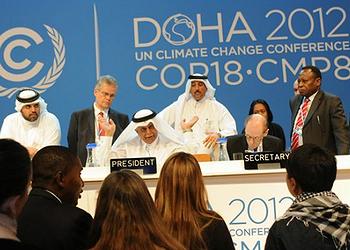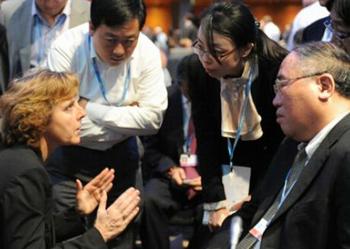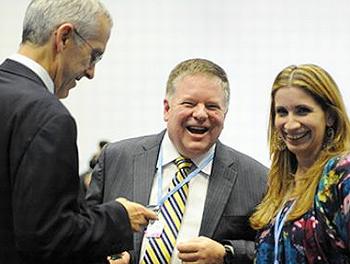 |
| Reviews and Templates for Expression We |
Doha Outcome: Kyoto Protocol Lives, Global Climate Deal by 2015
Without agreement at Doha the protocol would have expired in just 23 days.
Governments agreed to work toward a universal climate change agreement covering all countries from 2020, to be adopted by 2015, and to find ways to scale up efforts before 2020 beyond the existing pledges to curb emissions.

Conference President Abdullah bin Hamad Al-Attiyah of Qatar, center, explains a point to delegates on the last day of the UN climate change conference, December 8, 2012 (Photo courtesy Earth Negotiations Bulletin)
They agreed on a path to “raise the necessary ambition to respond to climate change,” which has devastated many parts of the world with extreme weather this year.
They also endorsed the completion of new institutions and agreed on ways and means to deliver scaled-up climate finance and technology to developing countries.
“Doha has opened up a new gateway to bigger ambition and to greater action – the Doha Climate Gateway. Qatar is proud to have been able to bring governments here to achieve this historic task. I thank all governments and ministers for their work to achieve this success. Now governments must move quickly through the Doha Climate Gateway to push forward with the solutions to climate change,” said the conference President Abdullah bin Hamad Al-Attiyah.
The Executive Secretary of the UN Framework Convention on Climate Change, UNFCCC, Christiana Figueres, called on countries to swiftly implement what has been agreed in Doha to keep the planetary temperature rise below the internationally agreed maximum of two degrees Celsius.
“I congratulate the Qatar Presidency for managing a complex and challenging conference,” said Figueres. “Now, there is much work to do. Doha is another step in the right direction, but we still have a long road ahead. The door to stay below two degrees remains barely open. The science shows it, the data proves it.”
“The UN Climate Change negotiations must now focus on the concrete ways and means to accelerate action and ambition. The world has the money and technology to stay below two degrees. After Doha, it is a matter of scale, speed, determination and sticking to the timetable,” she said.
In Doha, governments endorsed the selection of the South Korean city of Sondgo as the location of the Green Climate Fund and the work plan of the Standing Committee on Finance. The Green Climate Fund is expected to start its work in Sondgo in the second half of 2013, which means that it can launch activities in 2014.
Delegates also confirmed a consortium led by the UN Environment Programme as host of the Climate Technology Center, for an initial term of five years.
For long-term climate finance developed countries have reiterated their commitment to deliver on promises to continue long-term climate finance support to developing nations, with a view to mobilizing US$100 billion both for adaptation and mitigation by 2020.
The agreement also encourages developed countries to increase efforts to provide finance between 2013-15 at least to the average annual level with which they provided funds during the 2010-2012 fast-start finance period. This is to ensure there is no gap in continued finance support while efforts are otherwise scaled up.

European Climate Commissioner Connie Hedegaard of Denmark, left, consults with the Chinese delegation including Zhenhua Xie, right, at Doha, December 8, 2012 (Photo courtesy ENB)
Germany, the UK, France, Denmark, Sweden and the European Commission announced concrete finance pledges in Doha for the period up to 2015, totaling approximately US$6 billion.
While environmental groups were disappointed that governments did not accomplish more in Doha, extension of the Kyoto Protocol was viewed as an achievement.
“We are relieved to see countries coming together at the last minute to renew the Kyoto Protocol, even without some key players, because this is the only legally-binding agreement we have and therefore extremely important to maintain it and hopefully build on it when we achieve a global treaty in 2015,” said Rebecca Chacko, senior director for climate policy at the U.S.-based Conservation International.
Many environmentalists were bitterly disappointed in the outcome.
Friends of the Earth International spokesperson Asad Rehman said, “The Doha deal is as empty as a desert mirage. Despite the official spin, these talks delivered nothing – no real progress on cutting greenhouse gases and only an insulting gesture at climate finance.”
“The blame lies squarely with the rich industrialized world, most notably the U.S. The Obama administration is succeeding in its efforts to dismantle the UN global climate regime and other wealthy nations have joined in, paralyzing the climate talks and forcing the world’s poor to pay the price.” Rehman said. “We demand justice for the people of developing nations who suffer the most from the crisis, a crisis caused mainly by the rich industrialised world.”
Samantha Smith, leader of WWF’s Global Climate and Energy Initiative, said, “Some developed countries have made a mockery of the negotiations by backing away from their past commitments and refusing to take on new ones. And to make matters worse, it was only a handful of countries – such as Poland, Russia, Canada, the U.S. and Japan – who held the negotiations to ransom.”
“What science tells us and what millions of people experienced this year is that fighting climate change is now extremely urgent. Every year counts, and every year governments do not act increases the risk to us all,” said Smith.

U.S. climate negotiators Todd Stern, left, and Dan Reifsnyder consult with Venezuela’s Claudia Salerno, December 8, 2012. (Photo courtesy ENB)
“The acid test for these negotiations was real emissions cuts; real and concrete financial commitments for climate change; and the basis for a new global deal by 2015 that is both ambitious and equitable. But instead we got a shamefully weak deal, one that is so far away from the science that it should raise ethical issues for those responsible.”
Conservation International Senior Vice President for International Policy Dr. Fred Boltz said, “Nobody expected a major breakthrough to happen at this summit, but there has been virtually no meaningful progress on any important issue, including sustaining existing levels of financial support to help the most vulnerable nations cope with the negative impacts of climate change that, unfortunately, are already a reality.”
“It is a terrible and a terrifying irony that, while the efforts of the global community here are moving at a glacial pace, the world’s glaciers are now actually moving – or rather melting – even faster,” warned Boltz.
In view of the extreme storms, droughts and floods that have wreaked devastation on many parts of the planet this year, Boltz said, “The collective failure of countries to act with urgency and resolve is appalling; the threat of dangerous climate change could not be more apparent, and a growing chorus of scientific evidence warns us that time is running short to prevent irreversible harm.”
Tasneem Essop, head of the WWF delegation to the conference, and other environmentalists draw hope from the determination of civil society to motivate governments to make big cuts in greenhouse gas emissions.
“Hope is far from gone,” said Essop. “The movement gets stronger and more passionate everyday. Communities and people are standing up for clean energy, confronting dirty projects all over the world, such as coal, and demanding that changes be made. Here in Doha, for the first time in history, people marched to demand real leadership to tackle climate change.”
“Hope for a solution lies with the people,” Rehman said. “We must demand action from our governments and reject them if they fail to deliver.”
“The most significant development in Doha was what happened outside the plenary rooms, said Essop, “Social movements and civil society joined hands to take a stand against the lack of ambition and urgency in the climate negotiations. We will continue to work to ensure that governments are going to meet the 2015 deadline for a fair, ambitious and binding agreement.”
The next major UN Climate Change Conference will take place in Warsaw, Poland at the end of 2013.
|
|
|
|
Copyright 2011 Energy and Technical Services Ltd. All Rights Reserved. Energyts.com |